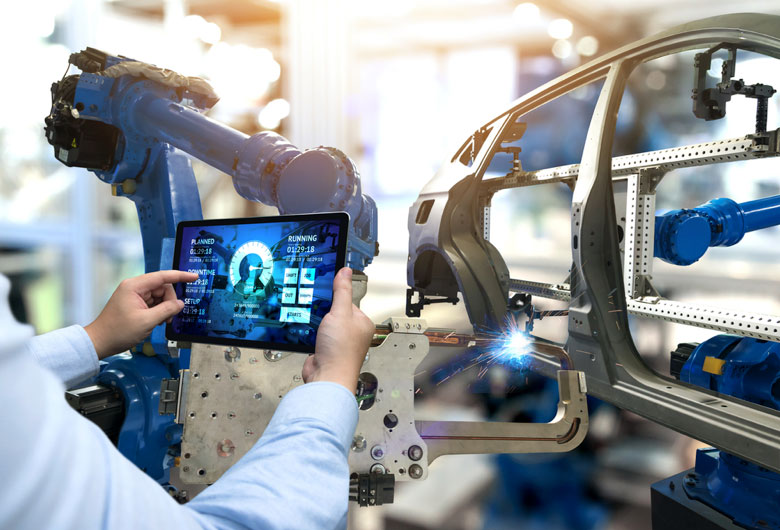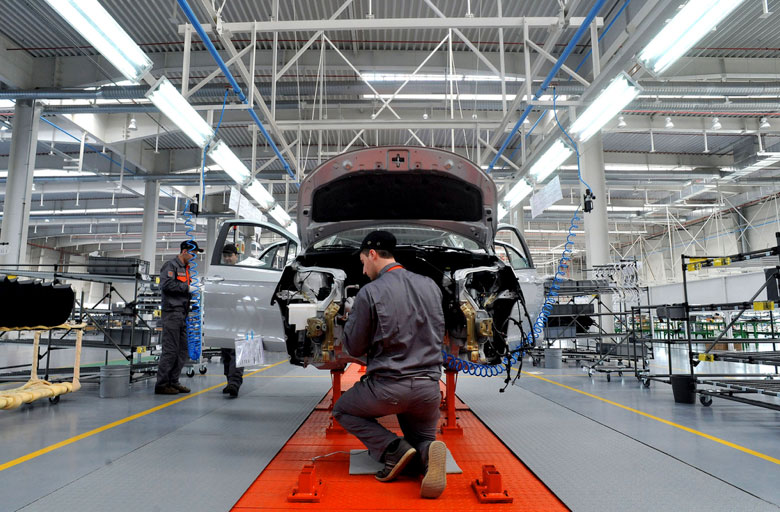July 22, 2019
We all know that, behind every big business, there’s a complex scaffold of software to support it. This is especially true when it comes to the automotive industry, where seemingly every minute, little component—from anti-lock braking to full-blown engine-management systems—is guided by technology. The “computerization of cars” is well underway, and there’s perhaps nowhere that’s more evident than in the automotive factory, where every rung of the supply chain is guided, monitored and analyzed by high-tech software. Specifically, they implement enterprise resource planning (ERP) software to help them stay ahead of the curve.

Auto industry manufacturers have found that distribution software and manufacturing ERP software are good investments in producing quality vehicles and distributing them effectively—so at every level and in every sector of the industry, ERP software is hard at work. Here are some concrete ways manufacturing software helps drive the car industry forward.
It Keeps Companies on Top of Compliance—Due to the auto industry’s complex relationship with consumer safety and environmental effects, it’s one of the most regulated sectors in the entire world. Various different automotive manufacturing software programs exist to keep makers on top of their regulatory strategies. The right manufacturing software will keep industry regulations in mind and help ensure that proper standards are met during development and production. ERPs also help makers keep meticulous track of their data, which allows for more transparency (which equals more compliance, in many cases) in the process.
It Keeps Costs Low—In any industry, one of the biggest benefits of adopting a new technology is to help shave off costs. In auto manufacturing, the goal is generally to keep costs low as they pertain to materials, warehousing, sales, staffing and production. On top of that, these programs do an incredible job at helping massive operations stay in the black with regard to their finances. As a result, companies that have switched to a high-tech, auto-focused ERP are typically able to lower costs and make investments elsewhere.
It Simplifies Complex Supply Chains—Even small auto projects have many complexities to address, and large ones present a daunting challenge for organization and planning. ERP software gives today’s engineers and producers the tools to address these challenges by consolidating many factors onto a single platform. In a well-implemented ERP system, every necessary data point and communication channel is only a click away, and departments can seamlessly collaborate on challenges large and small. It’s the most effective way to coordinate the numerous moving parts that characterize auto development in the new millennium.
It Makes Supply Chains More Mobile—There’s hardly an industry that hasn’t seen big changes since Apple’s 2007 introduction of the original iPhone, and in today’s auto world, nearly every technology flows through the power of the mobile device. The factory, testing facility and headquarters are now totally plugged-in, data-rich environments, and much of that is thanks to the rise of mobile devices like smartphones and tablets. Mobile devices have made it easier than ever for teams to stay in constant contact with each other, meaning that collaboration and problem solving can happen in real time. The best auto industry software integrates with mobile devices seamlessly so every facility is effectively and remotely connected.

It Works with CAD Software—The now-ubiquitous use of computer-aided design (CAD) software has changed the automotive industry in an incredible variety of ways. Using CAD to design cars, car parts and accessories allows engineers to avoid errors and make changes that would have taken many times as long without the software. From concept to draft to execution, CAD has changed the game at every stage of the design and development process. This means less need for prototyping and possibly even less need for testing thanks to complex, CAD-developed simulations and verification processes. Many of the most impressive ERPs offer CAD integration to help in manufacturing.
It Helps Aggregate Data—These days, you can’t expect to get anywhere if you’re not constantly recording, analyzing and making adjustments based on the data you’ve collected. Many of the biggest names in automotive manufacturing and development utilize their ERPs to help them build large, complex databases that inform business decisions and help them gracefully adapt at those times when agility is needed the most. This is especially important in areas such as fuel economy, consumer behavior and automotive performance.
It Allows for Unfettered Growth—At the end of the day, the biggest reason why most auto industry players invest in a powerful ERP is because they can use the program to drive serious growth, beginning on the most micro level. The fact of the matter is that manufacturing software helps keep track of every minor detail along the supply chain, from materials management to sales and marketing. This helps makers operate a leaner, more efficient business model, which means they can make quicker, more valuable decisions based on cold, hard data. This also helps engineers and others pitch new ideas to decision makers.

Today’s manufacturing software solutions have seen big advances from older models that had a reputation for being expensive and tough to implement. Many of these new models are cloud-based ERP products offered on a subscription model, so the up-front investment is much lower, and they’re also notably easier to implement and install. This is vital for the agile, adaptive manufacturer in today’s ever-evolving market, no matter what it’s producing.
If you’re looking to position your auto industry business as a serious player in a hyper-competitive market, then you have to get serious about implementing the right software and technology. Starting with a powerful, auto-focused ERP software will ensure that you’re on top of every tiny aspect of your business so you help it keep up the momentum for the long-run.
Christina Morrison serves as the General Manager for Top 10 ERP. She specializes in the development and management of Business to Business online properties which support businesses within specific industries with software evaluation tools and resources.
Scott Ellyson, CEO of East West Manufacturing, brings decades of global manufacturing and supply chain leadership to the conversation. In this episode, he shares practical insights on scaling operations, navigating complexity, and building resilient manufacturing networks in an increasingly connected world.